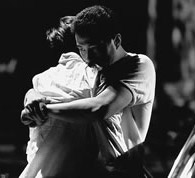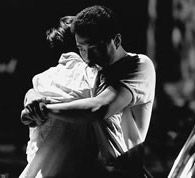John Frame of "Queer Radio" talks to Stanley Kwan, one of Hong Kong's few openly gay filmmakers, about his film Lan Yu which was screened at the 10th Brisbane International Film Festival. Based on a Internet circulated Chinese erotic novel known as Beijing Story, the drama tells the story about a businessman who finds true love with a male student activist in Beijing.

æ: Stanley Kwan, we're here in Brisbane City, just outside The Regent Cinema, and as part of the Brisbane International Film Festival, welcome to Queer Radio on 4ZZZ. How are you?
stanley: Good. Very nice weather and very nice city. This is really the first time I've been to Brisbane, but I feel good.
æ: We had the pleasure of seeing your film Lan Yu here last night as part of Brisbane International Film Festival and it's a very honest portrayal of how men can love each other. You must be happy with the film?
stanley: I'm quite happy - especially as I said last night, that this is the first time I've worked with a major Beijing film crew and I found the process very exciting and you know there are lots of efficient and talented crew members and actors in Beijing. So it was just a wonderful experience and during the shooting I found that they are also very devoted to the story - the emotion, the relationship of the characters. So I think somehow the final product I'm quite satisfied with, and part of the reason is that the whole crew was really devoted to it.
æ: I like the way that the characters are allowed to be men who are attracted to men and who love men - and that they don't have to justify that to the audience. Hangdong seems to be the main character, even though Lan Yu is the name of the film, but Hangdong seems to be trying to follow his heart. There's part of the film where he thinks that he could love a woman, and he goes in that direction. That's a real thing that happens to people doesn't it?
stanley: Yes, I think that. I have quite a number of friends (like that) who are really successful businessmen or celebrities in Mainland China. But it's the environment, you know? Even now the situation is more open, but actually homosexuality is still a taboo - not exactly prohibited, but it's still a taboo. So I think somehow it's not like the Western world, where gay people can really honestly "come out" or just be open about their choices, or their own sexuality, in front of the public.
æ: I like the way Lan Yu also presents the "day-to-day"-ness of the sort of relationships that men have.

æ: There are a lot of rapid scene changes, but it seems to take its time in developing the characters - so you do find a strong affinity with them as well. And it has a moderately tragic ending. One person questioned why a character had to die in the end, but that's part of the story obviously - you didn't just throw that in as an extra?
stanley: About the ending, for example in my relationship with my friend - my boyfriend - I always have a kind of feeling - I'm really afraid that someday all of a sudden maybe he, or maybe I, would disappear. Part of the reason is because I'm quite afraid of death but on the other hand, I maybe fantasise "What is death?" and so it is a very major element in all my films.
æ: There's a story by American Psychologist Dr Evelyn Hooker in which she says we are lucky to fall in love even once in our lives, but that very often there is a price to be paid. She says that shouldn't stop you falling in love, that you don't stop enjoying life.
stanley: Yeah, I totally agree with that feeling and I've got the same feeling, you know. I can imagine that, one day, if my lover all of a sudden died, I will have no regrets for being in love with this guy. I totally agree with what she said.
æ: I enjoy also with Lan Yu, that we get to see what upper-class suburban Beijing is like - it's something I've never seen before in film. It's really quite unusual isn't it?
stanley: It's really only part of it, you know, because this story only focuses on these two characters, but if you go to Beijing or see any other Chinese film, you can see about the society, after the financial and economic development, that it's changing a lot.
æ: The story that Lan Yu is based on is being represented as perhaps the most widely read Chinese novel - and it's an electronic novel, it exists only on the Internet. Because that story is so popular, do you expect that when Lan Yu is released on DVD, that it will be watched then throughout mainland China, even if it doesn't ever get to be in the cinema?
stanley: I think theatrical release is still impossible. From "day one" the financier and producer knew that. With this subject we thought there is no way that we can release the film in theatres in Mainland China. But we believe that the film's second life, the DVD market or the videotape market - that would be large in Mainland, because you know we set up a website for Lan Yu on the Internet and the audience response was excellent. So we are going to distribute the DVD, the VCD or videotape in Mainland on our own - and not particularly because of the money. We've made this film adapted from this popular novel and we would like that the product can be shown to most of the (potential) audience - especially the gay people, they are really longing for that.
æ: I would imagine that Lan Yu will have the same effect in China that Queer As Folk has had in Britain and America, in that it presents a realistic story for this couple of people and most of the rest of society will benefit from being able to see the stories told about those people.
stanley: Yes I expect that. We really expect that the market will be large.
æ: It's been a pleasure talking to you, Stanley Kwan - director of Lan Yu here at the Brisbane International Film Festival.
stanley: Thank you very much, I'm quite happy to be here - thanks!
Transcribed by John Frame 30th July 2001.
© John Frame johnvframe@yahoo.com
